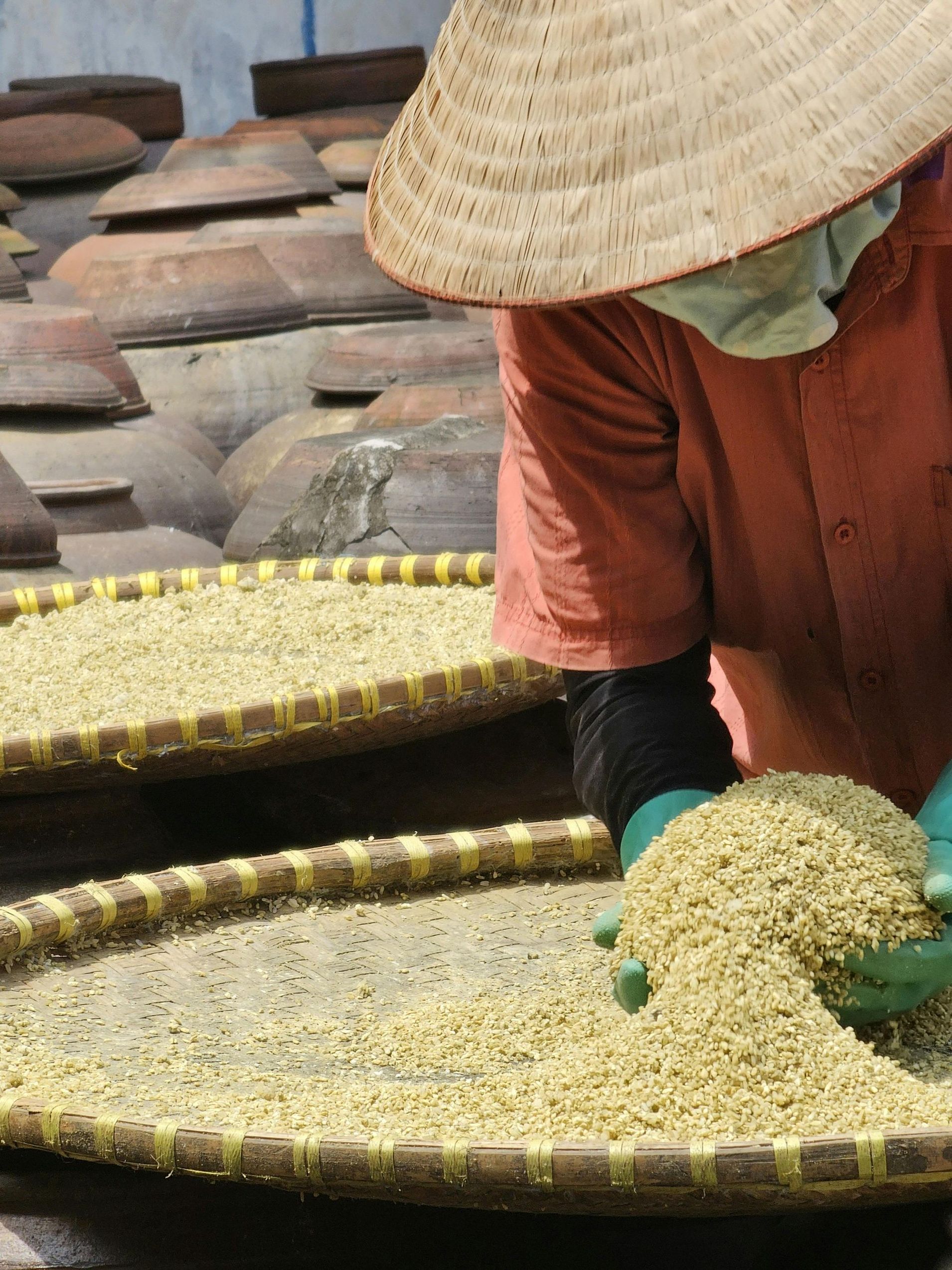Researching The Potent Abilities of Nitrogen Fermented Soy
Explore the evidence-based health benefits of nitrogen fermented soy backed by peer-reviewed research.
Search Articles
Overview
Understanding Nitrogen Fermented Soy
Fermentation is a time-honored process in which beneficial microorganisms such as Bacillus subtilis, Aspergillus oryzae, or Rhizopus oligosporus transform soybeans into forms that are richer in nutrients and easier for the body to absorb. Popular examples of fermented soy products include:
These foods are not just traditional kitchen staples — they’re biologically active and have been associated with a broad spectrum of potential health-supporting effects.
Taking this to the next level, Haelan 951 is more than just a fermented soy beverage—it represents decades of scientific inquiry into how nitrogen-assisted fermentation can transform the nutritional potential of soy. By breaking down complex compounds into highly bioavailable forms, this process preserves and enhances critical phytonutrients such as isoflavones, saponins, and amino acids. These compounds have been extensively studied for their roles in supporting immune function, reducing inflammation, and promoting cellular health. Researchers and clinicians around the world have examined nitrogen-fermented soy for its potential applications in oncology, hormonal balance, and chronic disease support. To explore the breadth of peer-reviewed studies and clinical insights that make Haelan 951 a unique nutritional intervention, continue to our detailed research page.
The Health Benefits: Backed by Research
Cardiovascular Health
Fermented soy, particularly natto, is a potent source of vitamin K2 (menaquinone-7). Vitamin K2 plays a key role in directing calcium to the bones and away from arteries.
- A Dutch cohort study (Geleijnse et al., Journal of Nutrition, 2004) found that higher vitamin K2 intake was associated with a 50% lower risk of arterial calcification and 57% lower risk of coronary heart disease.
- Nattokinase, an enzyme found in natto, has fibrinolytic properties—it may help dissolve blood clots and improve circulation (Sumi et al., Acta Haematologica, 1990).
Brain and Cognitive Function
Vitamin K2 in fermented soy activates osteocalcin, a protein critical for bone mineralization.
- The Japanese Adult Cohort Study (Ikeda et al., Osteoporosis International, 2006) reported that regular natto intake was associated with higher bone mineral density and reduced hip fracture risk in older women.
- Miso and tempeh also provide magnesium, calcium, and fermented isoflavones—all of which support bone remodeling.
Anti-Inflammatory & Antioxidant Effects
Fermentation enhances the activity of soy isoflavones like daidzein and genistein, which can modulate inflammatory pathways.
- A randomized controlled trial in Clinical Nutrition (Sasaki et al., 2019) showed that daily miso consumption reduced C-reactive protein (CRP) levels in adults with early-stage metabolic syndrome.
- Fermented soy peptides also demonstrate antioxidant activity, neutralizing free radicals that contribute to chronic diseases (Chung et al., Journal of Medicinal Food, 2008).
Gut Microbiome Support
Fermented soy delivers both probiotics (live beneficial bacteria) and prebiotics (compounds that feed good gut microbes).
- A study in
Frontiers in Microbiology (Suwandi et al., 2020) found that tempeh consumption increased
Bifidobacteria and Lactobacilli populations and improved
short-chain fatty acid production, which is essential for gut health.
- Miso soup also supports microbial diversity while being low in calories and rich in umami flavor.
Cancer Prevention
Fermented soy foods most notably nitrogen fermented are rich in isoflavones and other bioactive compounds that may have protective effects against certain types of cancer.
- Breast Cancer: A meta-analysis in
Cancer Causes & Control (2013) found that higher soy consumption was linked to a
28% reduced risk of breast cancer in women. Fermented soy may offer enhanced protection due to better isoflavone bioavailability (Zhang et al.,
Cancer Causes & Control, 2013).
- Prostate Cancer: Research published in The American Journal of Clinical Nutrition (2008) showed that men who consumed more soy protein had a lower risk of prostate cancer, especially in Asian populations (Wu et al., AJCN, 2008).
- Colorectal Cancer: Fermented soy may reduce colon cancer risk by improving gut microbiota and increasing short-chain fatty acid production (Miyoshi et al., Food Research International, 2019).
Conventional Fermentation vs. Nitrogen Fermentation
Conventional Fermentation
Traditional soy fermentation, used for centuries in foods like natto, miso, and tempeh, transforms soybeans into more digestible, nutrient-rich forms. This process:
- Reduces anti-nutritional compounds such as phytic acid
- Produces beneficial enzymes and peptides
- Generates isoflavones, but often in a mix of less bioavailable forms
- Offers documented benefits for heart, bone, and gut health
While valuable, conventional fermentation exposes nutrients to oxygen, heat, and extended processing times that can degrade some of soy’s most sensitive compounds.
Nitrogen Fermentation: Advancing the Science
Nitrogen-assisted fermentation takes the foundational benefits of traditional fermentation and optimizes them through a carefully controlled, oxygen-free environment. This advancement:
- Maximizes isoflavone potency by keeping them in the aglycone form, the most absorbable and biologically active state
- Preserves delicate phytonutrients — such as saponins and antioxidant enzymes — that are often lost in air-exposed fermentation
- Enhances amino acid bioavailability, improving the protein’s utility in tissue repair and immune function
- Protects against nutrient oxidation, maintaining a more stable and potent final product over time
Why Nitrogen Fermentation May Offer Superior Health Benefits
By preventing oxidative damage and preserving compounds that directly influence inflammation, immune function, and cellular repair, nitrogen-fermented soy may deliver a higher concentration of active nutrients per serving compared to conventional methods.
Early research suggests that these advantages could translate into stronger effects in areas such as:
- Modulating inflammatory pathways
- Supporting hormonal balance
- Enhancing antioxidant activity
- Improving nutrient absorption in individuals with compromised digestion or chronic illness
In short, nitrogen fermentation doesn’t replace the value of traditional methods — it builds on them, refining the process to protect and deliver more of soy’s most beneficial compounds to the body.

Organic vs. Non-Organic Soy
Soybeans are one of the most genetically modified crops in the world. Choosing organic and non-GMO fermented soy offers several advantages:
Studies suggest that organic soy may have slightly higher antioxidant levels, and consumers report fewer allergic reactions compared to conventional soy (Baker et al., British Journal of Nutrition, 2002).
- Reduced Pesticide Exposure:
Organic soy is grown without synthetic herbicides and pesticides, which can leave chemical residues in conventional products.
- Non-GMO Assurance: Non-GMO soy has not been genetically modified for traits like herbicide resistance. While research is ongoing, many consumers prefer avoiding GMOs for environmental and health reasons.
- Soil and Ecosystem Health: Organic farming practices prioritize biodiversity, soil regeneration, and reduced chemical runoff, which benefits the environment long-term.

Why It Matters
Most people consume soy in unfermented forms (like soy milk or protein isolates), which may contain anti-nutrients like phytic acid. Fermentation reduces these compounds, making nutrients easier to absorb and enhancing bioactivity.
This makes fermented soy a superior option for those seeking:
1
A plant-based source of complete protein
Fermented soy provides all nine essential amino acids your body needs, making it a rare complete protein from a plant source. It supports muscle maintenance, energy, and cellular repair—without the saturated fats of animal protein.
2
Cardiovascular protection without statins
Naturally occurring soy isoflavones have been shown to help lower LDL cholesterol and improve arterial flexibility. Incorporating fermented soy daily may reduce heart disease risk—without the side effects of pharmaceutical statins
3
Bone support without dairy
Fermented soy is rich in calcium and bioavailable nutrients that promote strong bones and reduce osteoporosis risk. It’s an ideal dairy-free option for those seeking natural bone health support.
4
Natural support for inflammation and brain health
Compounds like genistein and daidzein in fermented soy help modulate inflammation and support neural function. Emerging research also links soy consumption with improved memory and cognitive longevity.
5
Lower cancer risk with daily dietary integration
Epidemiological studies suggest that consistent intake of fermented soy may reduce the risk of certain cancers, particularly breast and prostate. Its unique phytochemicals support healthy hormone balance and cell regulation.
